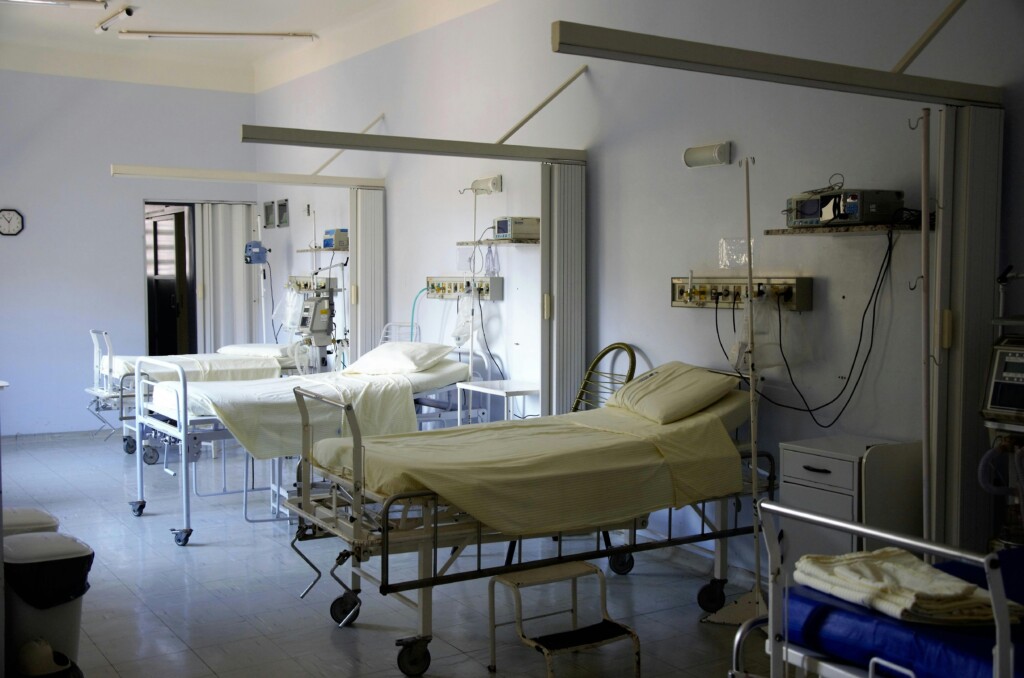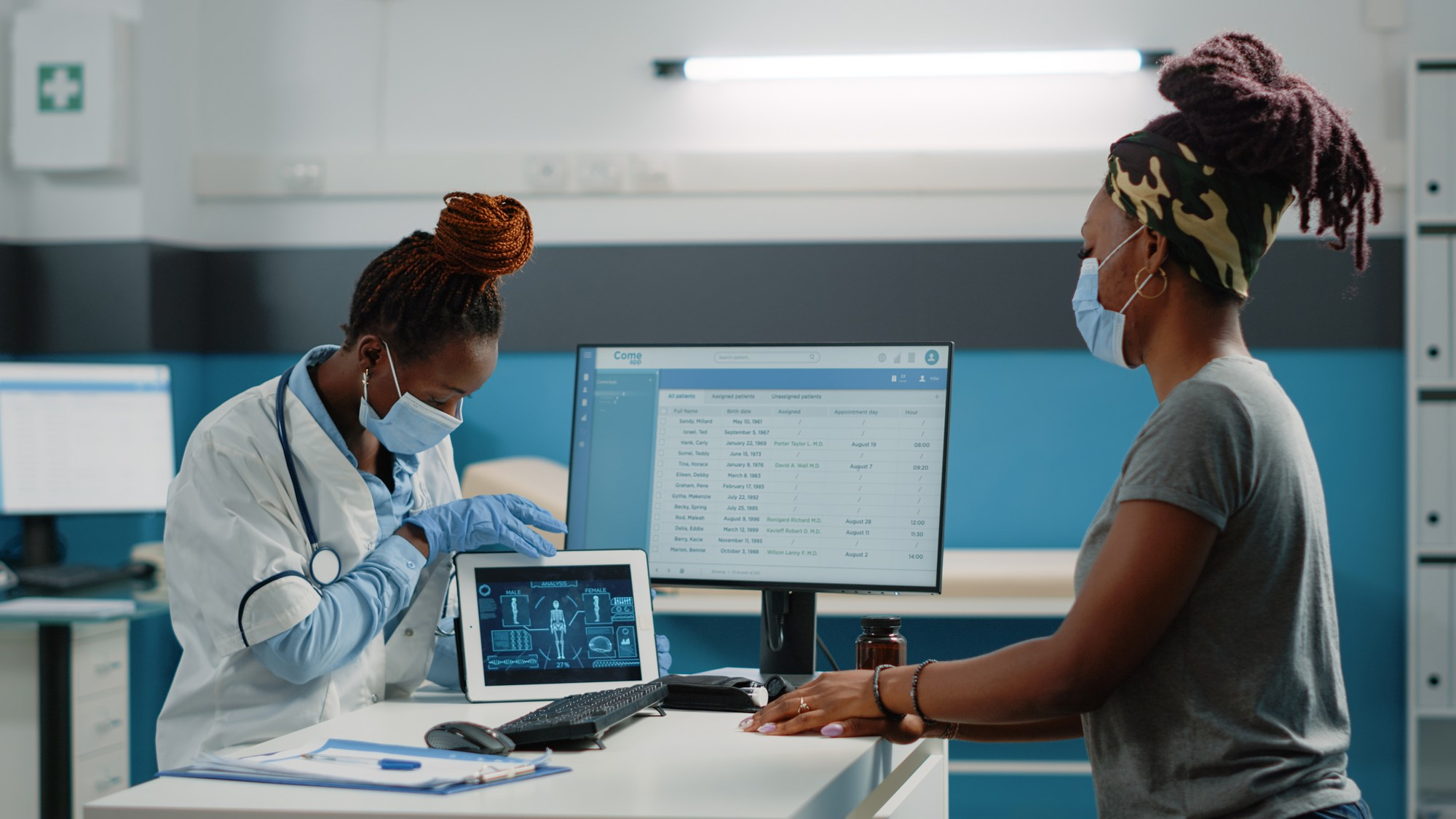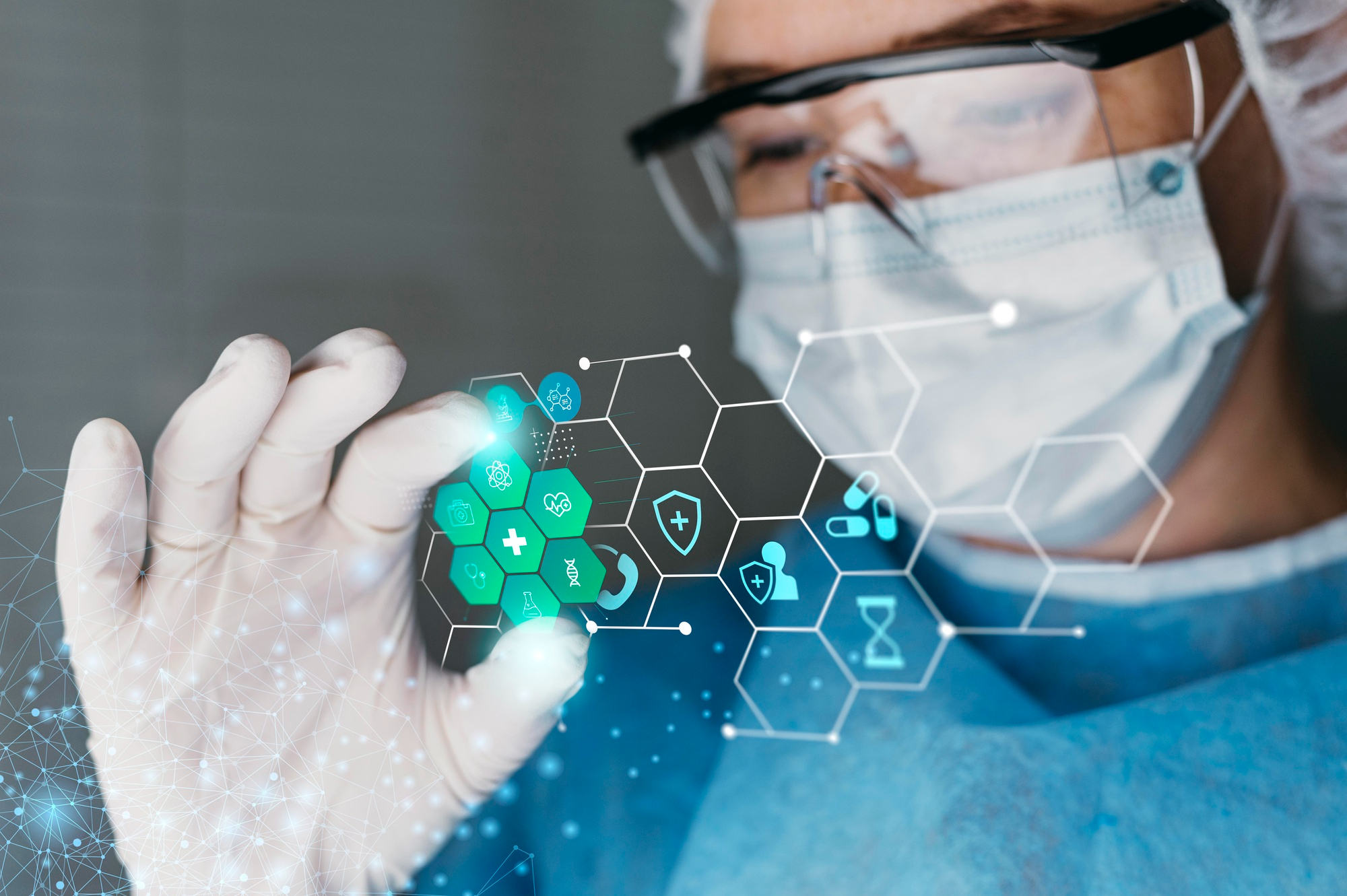Top 5 RFID Applications in Healthcare You Should Know


RFID Applications in Healthcare have become a cornerstone for myriad operations, transforming the landscape of medical services with improved efficiency, safety, and reliability. This technological marvel is not just about tracking items or people; it’s about ushering in a new era of precision, speed, and personalization in healthcare delivery.
Imagine a world where patient histories are accessed in the blink of an eye, medication errors are drastically reduced, and medical equipment can be tracked to the exact location in real-time. That’s the world RFID technology is creating within healthcare facilities.
RFID improves patient care accuracy and streamlines hospital operations, which lowers costs and improves patient outcomes. It does this by automating data collection and doing away with manual errors. Making a genuine difference in people’s lives and giving medical professionals more time to focus on patient care is more important than just having the newest technology.
RFID has many uses in the healthcare industry, ranging from making sure the right patient gets the right medication at the right time to closely monitoring pricey medical equipment. Not only are these applications changing the way hospitals operate, but they are also raising the bar for patient satisfaction, efficiency, and safety.
As we delve deeper into the top 5 RFID applications in healthcare, let’s keep in mind the transformative power of this technology, a beacon of hope for a more efficient, safe, and patient-centric healthcare system.
Top RFID Applications in Healthcare
1. Patient Tracking and Management
RFID stands out in this area by providing novel solutions to old problems. RFID tags that contain medical records enable doctors to track patients’ locations and treatment progress in real time. Reduced wrong-site surgeries and misidentification improve patient safety and streamline care, which benefits patients.
A leading hospital case study demonstrates RFID’s effectiveness in patient monitoring and administration. RFID technology significantly reduced hospital wait times and medical errors. The system also improved workflow, allowing staff to focus on patient care rather than administrative tasks. RFID technology’s operational efficiency and patient safety advantages were emphasized.
Patient tracking and management via radio frequency identification (RFID) can improve healthcare safety and efficiency. RFID technology, with its real-time data and error-reducing capabilities, is ushering in a new era of patient care in which efficiency and safety are inextricably linked.
2. Asset Tracking and Inventory Management
Healthcare organizations pioneered RFID asset tracking and inventory management. Hospitals and clinics have costly life-saving equipment and basic supplies. It can be difficult to manage stock levels and keep them where they should be at all times. RFID technology has revolutionized resource management.
RFID chips enable hospitals to locate and track their assets. This system minimizes equipment theft and loss while eliminating time-consuming manual searches. RFID-enabled inventory management systems monitor stock levels and notify employees of low supplies, preventing shortages.
RFID plays an important role here. Using RFID tool tracking, one hospital reduced pre-op time by 95 percent. Starting procedures on time, with all necessary equipment, improves patient care while saving money.
RFID inventory management and asset tracking show how intelligent solutions can address complex healthcare logistics issues. It enables physicians to prioritize patient care.
3. Medication Tracking and Management
RFID technology simplifies medication tracking and management, improving patient outcomes by lowering errors. RFID tags on hospital pharmaceutical packages allow for tracking from the pharmacy to the bedside.
This system ensures that the right patient receives the right medication at the right time, thereby reducing medication errors. RFID automates inventory levels and monitors drug expiration dates, ensuring that medications are always available and within their use-by dates.
RFID improved medication management at one healthcare facility, resulting in a significant reduction in medication errors. After implementing RFID, the healthcare facility experienced a 41% decrease in prescription errors and a 50% increase in medication inventory management efficiency.
These enhancements improve patient safety and operational efficiency while reducing costs. RFID medication tracking and management are examples of digital innovations that can improve healthcare safety and efficiency. RFID systems provide real-time drug usage and availability information, thereby improving patient care and safety.
4. Blood Banking and Handling
Healthcare blood supply management necessitates precision and consistency. Blood products face numerous challenges during donation and transfusion, necessitating close monitoring to ensure their safety. Radio frequency identification technology is essential in blood banking and processing due to its accuracy and productivity.
Savage bag RFID tags are used to track blood products throughout their life cycle. This novel approach enhances transfusion safety by streamlining blood storage and distribution. RFID technology improves patient outcomes by reducing contamination, expiration, and enabling accurate blood type matching.
According to studies, RFID has the potential to transform the vital blood banking industry. RFID technology used in a hospital’s blood bank increased blood supply chain management by 20%. This resulted in increased blood product utilization, lower expiration waste, and safer transfusions. Real-time blood product tracking improves inventory levels by ensuring that blood is available when needed.
RFID reporting and compliance capabilities improve operational efficiency. Blood product safety is strictly monitored. RFID ensures accurate blood storage and movement documentation, which increases compliance.
RFID in blood banking and processing demonstrates how technology is transforming critical healthcare processes. This technology guarantees safe blood product manipulation.
5. Surgical Instrument Tracking
The operating room is the heart of any hospital, where precision and efficiency can mean the difference between life and death. To ensure accuracy, surgical instrument tracking monitors all tools used during and after the procedure. Radiofrequency identification improves surgical safety and efficacy.
RFID tags on surgical instruments enable hospital tracking. This keeps all tools sterile, accessible, and, most importantly, recoverable following the procedure. This system simplifies surgical cleaning and preparation while significantly lowering the risk of leaving instruments inside a patient, a rare but catastrophic event.
Studies show that RFID for surgical instrument tracking enhances patient safety, instrument counting, and surgical team efficiency. RFID technology reduced instrument misplacement by 60% at a top hospital, resulting in better surgical outcomes.
RFID tracking of surgical instruments aids in meeting health regulations while also providing accurate use and sterilization records. The hospital’s reputation for patient care improves, as does its cleanliness and security.
Impact of RFID Technology on Healthcare
RFID technology has significantly enhanced healthcare delivery, security, and efficiency. Its diverse applications, ranging from patient tracking to surgical instrument management, have an impact on its operational performance.
RFID integration improves patient outcomes by allowing for accurate patient identification, effective medication management, and safe blood product handling. Accuracy promotes health and patient satisfaction.
RFID also improves healthcare operational efficiency. Hospitals and clinics can provide better care at a lower cost by optimizing resource utilization and reducing waste. Radio frequency identification technology simplifies operations, resulting in shorter patient wait times. This reduces the time it takes to schedule surgeries, fill prescriptions, and check in.
RFID technology enhances patient care, operational efficiency, and public health surveillance and management. Radio frequency identification systems can monitor disease trends, control epidemics, and manage supplies during public health emergencies. This demonstrates its ability to combat global health issues and achieve public health objectives.
Top RFID Companies in World Contributing to Healthcare

Innovative products and industry leaders’ efforts fueled the RFID revolution in healthcare. These innovators used RFID Technology Solutions to improve healthcare. Check out some of the top RFID companies changing healthcare:
- Zebra Technologies
- Zebra Technologies, a leading provider, offers healthcare RFID solutions. Zebra’s asset tracking and patient wristbands protect patients, improve operations, and help track medical supplies and equipment.
- Impinj
- Impinj’s RAIN RFID solutions connect billions of medical pharmaceuticals and surgical instruments. Their platform’s real-time item identification, location, and authentication improve patient care while reducing errors.
- Honeywell
- Honeywell’s RFID systems improve patient care and clinical workflow. Asset and patient tracking solutions help hospitals improve efficiency and quality.
- Alien Technology
- Alien Technology’s RFID tags, readers, and software assist with patient tracking, inventory management, and medication authentication. The company oversees RFID development. The innovation ensures that medical professionals have constant access to data and resources.
- Avery Dennison
- Avery Dennison RFID technologies monitor and administer medical supplies, medications, and lab specimens, thereby improving patient outcomes and operational efficiency. Their solutions meet the healthcare industry’s safety and compliance requirements.
RFID Software Companies Paving the Way for Future Healthcare Solutions
Software transforms raw data into insights, ensuring the success of RFID technology in healthcare. RFID asset tracking, management, and patient safety require software to be fully utilized. RFID software companies are transforming healthcare:
- GlobeRanger
- GlobeRanger’s IoT and RFID software stand out among Fujitsu’s offerings. Efficiency in tracking and management enhances operations, patient care, and asset visibility on their platform. GlobeRanger software is required when implementing RFID in hospitals.
- RFID4U
- RFID4U develops patient and asset management RFID software. TagMatiks’ RFID technology improves healthcare patient outcomes, asset management, and operational efficiency.
- Terso Solutions
- Terso Solutions specializes in RFID Applications in Healthcare and life sciences applications. The products handle inventory, security, and compliance for costly laboratory and medical equipment. Their Jetstream cloud-based data collection and analysis platform improves healthcare decision-making.
- STid
- STid’s RFID software improves healthcare asset tracking and patient data security. Their cutting-edge software enables healthcare organizations to comply with stringent regulations while also protecting sensitive data.
- SimplyRFID
- SimplyRFID’s advanced software makes RFID implementation simple. Medical facilities can improve their safety and efficiency by using Nox and Wave to track assets, inventory, and patients.
- 44degNorth
- A smart RFID startup 44degNorth is making waves in retail and inventory. In addition to software, this company provides small businesses with hardware and implementation.
Conclusion
RFID can transform patient tracking, asset management, surgical instrument handling, and patient care. The top five healthcare uses of RFID are patient, medication, surgical instrument, blood banking, and asset tracking.
Leading RFID software and hardware companies are advancing this technology, enabling future innovations. RFID software analyzes RFID tag and reader data to improve operations and patient care. Pioneers in radio frequency identification software development are laying the groundwork for future healthcare solutions.
RFID technology can create a more sustainable, effective, and patient-centered healthcare system. This technology could solve urgent medical issues while improving efficiency, accuracy, and safety.
For healthcare facilities looking to embrace the future of patient care, working with 44degNorth offers a strategic advantage. With expertise in integrating RFID technology into healthcare practices, 44degNorth is your partner in transforming healthcare delivery.
By leveraging our RFID Applications in Healthcare, healthcare providers can unlock the full potential of RFID technology, ensuring a higher standard of care and operational excellence.
The time to embrace this change is now—let 44degNorth guide you through this transformation, ensuring your healthcare facility is at the forefront of innovation and patient care.
Ready to revolutionize your healthcare practice with RFID technology?
Contact 44degNorth today to explore how our solutions can enhance your operations and patient care.
Call Now: +1 (647) 937-9080
Email At: innovation@44degnorth.tech
